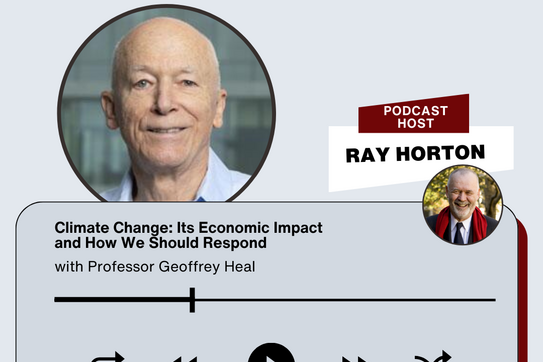In this episode of More MPE, host Professor Ray Horton speaks with Geoffrey Heal, faculty leader of the Sanford C. Bernstein & Co. Center for Leadership and Ethics and Donald C. Waite III Professor of Social Enterprise at Columbia Business School.
More MPE devotes three sessions to climate change because it is the paramount issue facing the businesses, governments, and societies of the world. An economist and conservationist, Heal’s teaching and research have left an indelible mark on the School. That it stands out as the leader in business school education in climate change is due in large part to his work.
The first question addressed in the session addresses foreseeable impacts of climate change, that is, consequences that are predictable absent the failure to mitigate global warming. One of the most obvious is sea level rise, which by the end of the century will cause 15 to 20 percent of the world’s population to relocate unless climate change is mitigated. The refugees will not only be people from countries like Bangladesh, but South Floridians whose homes are their primary assets will also be refugees. Animal life, and indirectly humanity, will be affected by the loss of a third of all species. Of course, not all such impacts lie in the future. The increasing number of international migrants, including many who are migrating to the United States, reflects the impact of climate change on agricultural productivity. Rising heat and humidity are already killing Indians and Pakistanis who labor without air conditioning.
The next issue concerns progress being made to mitigate, or reduce, the baleful impacts of climate change, which essentially means the steps being taken to lower the stock of carbon dioxide in the atmosphere. There are three major sources of carbon dioxide emission — the generation of electricity, transportation, and heating. Considerable progress is being made in electrification; worldwide, 40 percent of electricity is now generated by non-carbon sources, including wind, solar, geothermal, hydro, and nuclear. Progress in reducing transportation emissions has been slower. Electric vehicles are coming to use much more rapidly in China and Europe than in the United States, where large, gas-guzzling vehicles are a cultural preference.
The conversation turns to a discussion of the many political challenges to fighting climate change in the United States and abroad, including those on the political right who either deny the existence of climate change or believe that government should leave the fight to business.
We end with a discussion of how climate change is being incorporated into the life of Columbia Business School. One such way is through the Climate Practitioner’s Network (CPN), a new initiative of the Tamer Center for Social Enterprise that helps alumni leaders in climate stay connected — to each other and to the latest innovations and talent at CBS. Interested alumni can learn more and sign up on the Tamer Center website. Alumni can also get involved through the School's Executive Education programs on climate change.
Mentioned in this episode:
- Geoffrey Heal (Columbia Business School)
